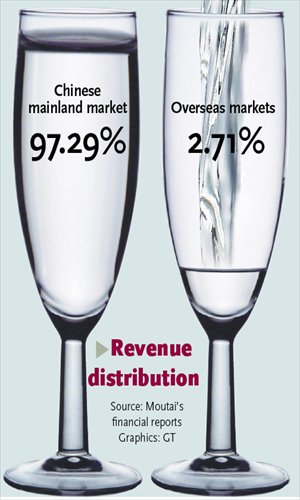HOME >> BUSINESS
Kweichow Moutai to buy Paris real estate
By Yang Jing Source:Global Times Published: 2013-11-12 23:43:01

Source: Moutai's financial reports Graphics: GT
Domestic high-end baijiu (white liquor) producer Kweichow Moutai Co Ltd announced Tuesday that it will invest 8.79 million euros ($11.76 million) to buy real estate property in Paris to help further its business in Europe.
This is part of Moutai's globalization strategy, Yang Qingshan, executive president of the China Brand Strategy Association, told the Global Times Tuesday.
Currently, Moutai has a wide market including Asia, Europe, America, Oceania and South Africa, China Securities Journal reported Tuesday, noting that with such a wide global sales network, Moutai exported almost 1,000 tons of baijiu in 2012, accounting for only 4 percent of the total output of 24,999 tons.
These overseas exports brought in revenue of $175 million, an increase of 60 percent from 2011.
Hong Kong-based Silver Base Group Holdings Ltd obtained the distribution rights of Moutai in Poland, Hungary, the Czech Republic, Slovakia and Bulgaria starting from January 1, 2013, Silver Base Group announced on its website on March 11.
However, Moutai's revenue from markets outside of the Chinese mainland is still quite small.
The revenue from overseas markets for the first half of 2013 is 382 million yuan ($62.72 million), only 2.71 percent of its total revenue, according to Moutai's mid-year report released on August 31 on the website of the Shanghai Stock Exchange.
The majority of exported Moutai baijiu is bought by Chinese who work in or have immigrated to foreign countries, Yang said, noting that Moutai is confronted with a great challenge if the company wants to promote its baijiu products to non-Chinese customers.
Unlike other liquor that Western consumers are familiar with such as vodka, Moutai baijiu is much stronger, Yang said, noting each 100 milliliters (ml) of vodka contains about 40 ml alcohol, but each 100 ml of Moutai baijiu includes about 50 ml alcohol.
In addition to higher alcohol content, due to different brewing technology, Moutai baijiu has a unique taste which new customers will need time to get used to, Yang said.
Although it is hard for Moutai to attract non-Chinese customers, going global is an inevitable choice for enterprises, Ma Wenfeng, an analyst with Beijing Orient Agribusiness Consultant Ltd, told the Global Times Tuesday.
The sluggish domestic market has also encouraged liquor producers to explore new markets, Yang said, noting Moutai is not the only one.
Tang Qiao, chairman of Wuliangye Group, also a baijiu producer, will go to the UK from November 19 to 23 and meet with Diageo, according to media reports. But both sides denied specific cooperation plans, according to media reports.
The UK liquor producer Diageo acquired Chinese baijiu producer Sichuan Swellfun Co in 2012.
China's liquor market, especially the high-end sector, has been cooling down since the central government launched an anti-extravagance campaign early this year.
The total revenue of 13 listed Chinese baijiu enterprises in the first three quarters dropped 3.17 percent year-on-year, and the total net profit decreased 6.33 percent year-on-year, news portal chinanews.com reported Monday, noting it is the first time the industry has experienced falling profits in nine years.
In addition to baijiu, Moutai is also trying to develop its wine brand Moutai Wine, which Moutai set up a joint venture in 2002 to produce.
Moutai has bought French wine estates including Chateau Dallau in 2012 and Chateau Loudenne in May this year, Moutai's website said on May 24.
However, Yang said producing wine was just to diversify Moutai's business and its focus will still be baijiu.
The company could not be reached for comment by press time.
Posted in: Companies